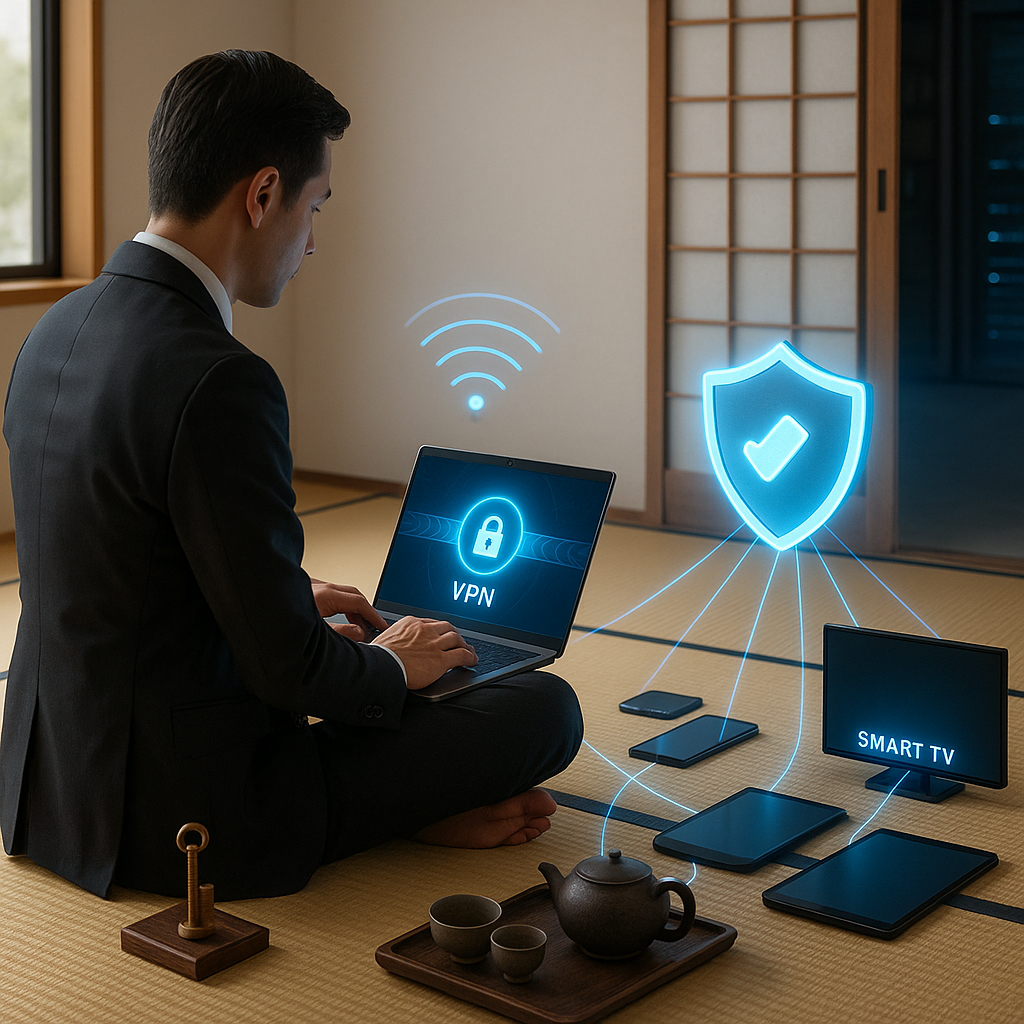Key Takeaways
- A Virtual Private Network (VPN) is increasingly vital for anyone wanting to protect their online privacy and browse the internet more securely. For beginners, this guide will clarify the essentials, explain how VPNs shield your information, and provide practical, easy-to-follow steps for safe setup, regardless of your tech background.
- Experience discreet browsing through encrypted connections. VPNs obscure your true IP address and use robust encryption to build a secure tunnel for your data. This keeps your online actions hidden from advertisers, ISPs, hackers, and data trackers.
- Keep your personal information safe, even on public Wi-Fi. VPNs safeguard sensitive details like passwords and financial data from interception when connecting to unsecured hubs at cafés, hotels, airports, and other public places.
- Not all VPNs guarantee privacy or performance. Paid, reputable VPN services generally offer stronger security, true no-logs policies, and faster speeds than most free alternatives, which may track activity or inject ads.
- Simplify your decision-making when choosing a VPN. Focus on services that deliver strong encryption standards, verified no-logs policies, intuitive app experiences, and broad compatibility across your devices for seamless protection.
- Device-friendly setup has never been easier. Clear, step-by-step guides help you install VPNs on smartphones, laptops, tablets, routers, and smart TVs. No technical jargon or expertise required.
- VPNs substantially boost privacy but are not a one-stop solution. While VPNs conceal your IP and encrypt your traffic, complete online anonymity is never guaranteed. Practicing safe digital habits remains essential for all users.
- Understand the legal landscape. VPN usage is permitted in most countries, but always check your local regulations and use VPNs responsibly to avoid unforeseen legal or policy issues.
This comprehensive guide will confidently lead you from the fundamentals of online privacy to the practical setup of a VPN, ensuring robust digital protection is accessible for everyone, no matter your experience level.
Introduction
Have you ever considered how much of your digital activity is potentially exposed to prying eyes? Whether you are online banking, shopping, working remotely, or simply browsing at your favorite café, your personal information is at risk of being accessed by hackers, advertisers, or even your internet service provider. Grasping what a VPN is (and how it secures your privacy) is now more relevant than ever.
A VPN, or Virtual Private Network, establishes a private, encrypted communication channel that conceals your actual IP address and shields your internet activity from unwanted surveillance. Choosing the right VPN can be confusing, but the good news is that setup is straightforward even for non-technical users. In this guide, we demystify internet privacy, clarify how VPNs secure your data, and walk you through simple installation steps for any device so that anyone can strengthen their digital security with confidence.
Understanding VPN Basics
A VPN (Virtual Private Network) works as a secure “tunnel” routing your internet traffic between your device and the web. Imagine mailing a confidential document using a tamper-proof envelope that only the recipient can open. This illustrates how a VPN preserves the privacy of your online actions. The encrypted connection created by the VPN wraps your data in protective code, making it incomprehensible to anyone attempting to intercept it.
Un passo avanti. Sempre.
Unisciti al nostro canale Telegram per ricevere
aggiornamenti mirati, notizie selezionate e contenuti che fanno davvero la differenza.
Zero distrazioni, solo ciò che conta.
 Entra nel Canale
Entra nel Canale
How VPNs Actually Work
When you activate a VPN, your internet traffic is processed through three crucial stages:
- Encryption: Your information is converted into encrypted code that outsiders cannot decipher.
- Tunneling: This encrypted data travels through a secure channel, separated from the open internet.
- Server Connection: Your activity appears to originate from the VPN server’s location, not your own.
Tech Tip: Using a VPN is like entering a building through an exclusive side entrance. Your destination is the same, but your entry is private and less noticeable.
VPN Benefits for Everyday Users
Enhanced Privacy Protection
VPNs are powerful tools for reclaiming privacy from numerous entities:
- Internet Service Providers (ISPs): Cannot log or track your browsing activity.
- Public Wi-Fi Eavesdroppers: Hackers are blocked from intercepting your data.
- Websites and Trackers: Struggle to precisely identify your real location or digital footprint.
These privacy benefits are valuable for individuals at home, remote workers, travelers, and anyone who values discretion online.
Accessing Geo-Restricted Content
VPNs can help you bypass regional content restrictions on streaming services, news sites, and apps, subject to local laws and service terms. For example, you can access favorite shows when traveling, reach online educational resources from anywhere, or use platforms that might otherwise be unavailable. However, be aware that some companies actively block VPN connections or may require proof of residence, so your success can vary.
Security on Public Networks
Public Wi-Fi (such as in coffee shops, hotels, airports, and libraries) is a favorite target for cybercriminals seeking unprotected data. With a VPN, you gain a critical layer of security:
- Banking credentials stay protected from digital “snoopers.”
- Email and messaging passwords remain confidential.
- Personal communications remain unreadable to outsiders.
This is especially beneficial for business professionals, students, healthcare practitioners handling sensitive patient information, and anyone who relies on public networks for daily connectivity.
Applications Across Multiple Domains
The advantages of VPNs aren’t limited to personal use. In the financial sector, remote traders and analysts use VPNs to securely access sensitive data. Legal professionals employ VPNs to ensure client communications remain privileged. In education, VPNs help teachers and students safely access online learning resources beyond geographical barriers. Environmental researchers use VPNs to coordinate securely on global projects. Retailers and e-commerce platforms protect transaction data and customer privacy during peak shopping periods. These varied examples show that no matter your field, VPNs can significantly enhance security and accessibility.
Choosing the Right VPN
Essential Features to Consider
Selecting a VPN shouldn’t feel overwhelming. Here’s what to prioritize:
- Server Network: Look for services offering a broad network across multiple continents for flexibility and performance.
- Speed Capabilities: High-speed servers reduce buffering during streaming, conference calls, or cloud backups.
- Device Compatibility: Confirm support for Windows, macOS, Android, iOS, smart TVs, routers, and browser plugins for all-round protection.
- User Interface: Choose a provider with intuitive, straightforward apps, making it easy for anyone to use.
Additionally, investigate features like kill switches (which halt traffic if the VPN drops), split tunneling (for customizing which apps use the VPN), and strong customer support for troubleshooting.
Free vs. Paid Services
While free VPNs are tempting, they often compromise user privacy and performance:
- Narrow server options (fewer choices for speed and reliability)
- Data limitations that can disrupt streaming or large downloads
- Slower speeds due to overcrowding
- Risks of tracking and selling your browsing activity
- Annoying in-app advertisements
A reputable paid VPN typically costs $3 to $12 per month billed annually. Well worth it for enhanced privacy, better speed, and customer support.
Evaluating Trustworthiness
Also, consider provider reputation, independent security audits, transparency about privacy policies, and user reviews. Select companies with a strict no-logs policy and a proven track record of defending user privacy in various industries.
Setting Up Your First VPN
Windows Setup Guide
- Download the official application from your chosen VPN provider.
- Run the installer and follow the on-screen prompts, granting permissions if requested.
- Launch the application and log in with your account credentials.
- Click the “Quick Connect” button or select a specific server location as needed.
- Wait for confirmation. You’re now protected.
Mobile Device Setup
For smartphones and tablets:
- Open the official app store (Google Play or Apple App Store) on your device.
- Search for your selected VPN provider’s official app and install it.
- Open the app, sign in, and allow necessary permissions for VPN configuration.
- Tap to connect and select a preferred server if desired.
Router and Smart Device Integration
Some advanced users or businesses secure all network traffic by installing VPNs on routers. Setup usually involves logging into your router’s admin panel, entering VPN configuration details, and saving the settings. Many VPNs also offer dedicated apps or browser plugins for smart TVs and game consoles, further expanding your security coverage.
Common Setup Issues
If you encounter connection problems:
Un passo avanti. Sempre.
Unisciti al nostro canale Telegram per ricevere
aggiornamenti mirati, notizie selezionate e contenuti che fanno davvero la differenza.
Zero distrazioni, solo ciò che conta.
 Entra nel Canale
Entra nel Canale
- Restart the VPN application or your device.
- Ensure you have a reliable internet connection.
- Double-check your username and password.
- Try an alternative server location.
- Make sure your subscription is active and not expired.
- Review any firewall or antivirus settings that may block VPN traffic.
All major VPN providers have customer support or detailed FAQs if you need additional help.
Using Your VPN Effectively
Best Practices
- Connect Before Activities: Activate your VPN prior to logging in to banking, email, or sensitive work tasks.
- Select Nearby Servers: For best speeds, connect to servers geographically close to your current location.
- Update Regularly: Install updates to ensure you receive the latest security patches and features.
- Monitor Your Connection: Check the VPN status icon or notification regularly to verify protection.
Performance Optimization
For a smooth experience:
- Choose servers with the lowest load; many apps display server traffic in real time.
- Use split tunneling to direct non-sensitive activity (such as streaming music) outside the VPN, maximizing speed for vital tasks.
- Let the app recommend optimized servers for streaming, torrenting, or business use.
- If traveling, connect to servers nearest your online destination (such as U.S. or EU servers for American or European services).
Implementing these strategies makes VPN use seamless for daily routines across personal, professional, and educational activities.
VPN Privacy and Legal Considerations
Understanding VPN Limitations
VPNs greatly enhance privacy, but it’s important to recognize their boundaries:
- VPNs do not make you fully anonymous; highly targeted surveillance may still succeed.
- Advanced websites and platforms sometimes detect and block VPN usage.
- VPN providers (especially disreputable ones) may store logs, potentially exposing activity if compelled by legal processes.
- You may notice a slight reduction in internet speed, especially on distant servers.
Just as using a secure lock doesn’t guarantee absolute safety, a VPN is one crucial layer in a comprehensive digital security plan. It should be complemented by strong passwords, cautious web habits, and updated software.
Legal Aspects
VPN use is widely legal, but laws can vary significantly by region:
- Some countries, such as China or Russia, impose restrictions or outright bans on VPNs. Always review local laws before traveling or connecting.
- Using a VPN does not legalize prohibited activities; copyright infringement or malicious actions remain illegal.
- Corporate and academic IT departments may restrict VPN usage on managed devices or networks.
- Educational platforms, financial services, or streaming providers may block VPN traffic in some circumstances.
When in doubt, check the terms of any services you access and stay informed about national digital privacy regulations.
Conclusion
By understanding how VPNs work and why they matter, you empower yourself to navigate today’s digital world with far greater confidence. VPNs deliver essential privacy protection, secure your personal and professional information on public and home networks, and give you new choices in accessing content across borders. From healthcare professionals securing sensitive data, to students safeguarding their research, to families protecting shared devices, VPNs are an adaptable layer of defense for everyone.
However, as cyber threats and online surveillance techniques evolve, the need to embrace proactive, multilayered digital protection becomes paramount. Combining a trustworthy VPN with smart internet habits and regular security awareness is now an essential practice for every connected individual.
Looking ahead, those who prioritize privacy and make informed tech choices will lead the way in the coming era of digital empowerment. By making VPN protection a core part of your digital routine today, you not only shield yourself from modern risks but set the foundation for safer, smarter interactions in our increasingly connected world. Are you ready to take control? Adopt strong VPN practices and make privacy an unshakeable pillar of your online life. Maybe even encourage your community to do the same. Tech made simple, sensei-style.





Leave a Reply